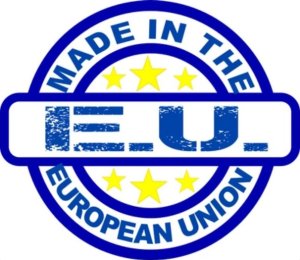State Department blasts the European Union’s proposed Space Act

This label would be more accurate if it read
“NOT made in the European Union”
In a comment the State Department posted on November 4, 2025 on the European Commission’s website for public comment in connection with the European Union’s proposed Space Act, the Trump administration lambasted that law as imposing “unacceptable regulatory burdens on U.S. providers of space services to European customers.”
As a general matter, the United States expresses deep concern regarding measures in the proposed Act that would impose unacceptable regulatory burdens on U.S. providers of space services to European customers.
As close partners in civil, commercial, and security aspects of space cooperation for decades, the EU should proceed cautiously when developing and refining the proposed EU Space Act to ensure it provides a permissive and adaptable framework that promotes innovation, investment, and fair competition for the U.S., EU, and EU member states commercial sectors, while respecting each other’s sovereignty. Otherwise, the ability of the United States, the EU, and EU members to maintain government-to-government burden-sharing partnerships could be threatened. These non-tariff barriers would introduce challenges in the areas of space weather, remote sensing, space exploration, spaceflight safety, space debris mitigation and remediation, communications, as well as cooperations with the European Space Agency.
No one should be surprised by this response. Trump has always been aggressive in his desire to limit regulation. He has also been passionate about defending U.S. sovereignty. As I noted in June 2025 when the law was first released,
It imposes new environmental, safety, and cybersecurity regulations on the design of satellites and spacecraft in a manner that will likely slow development and competition in Europe significantly. And it applies these regulations not only to European companies but to the rest of the world’s space industry, should it do any operations at all in Europe. [emphasis mine]
More analysis of the State Department’s position here.
In particular, State argues that several provisions seemed aimed at US companies solely because of their size and dominance in the global market, especially in the area of “large telecommunications constellations” — that appears to be, while not specifically saying so, taking aim at EU efforts to counter SpaceX. “Such unfair and unwarranted regulations are unacceptable to the United States and must be removed,” the document states.
This second link also notes something I have pointed out previously, that there are a number of European nations that oppose this law as well, seeing it as a hammer that will smash their new emerging independent and competitive space industries.

European Union to the rest of the world: “You sure have
a nice space industry. Shame if something happened to it.”
The regulatory demands of this new law are so egregious that even those in Asia have noticed. An op-ed in the Asia Times today blasts the EU for even considering this law. It also notes the sharp contrast between the American demand for freedom and Europe’s love of regulation.
This disagreement runs deeper than legal semantics. It is about how the West conceptualizes governance in the new space age. Europe advocates for a top-down, precautionary approach — regulating first, innovating later.
The US favors an entrepreneurial model — innovating first, regulating later. The tension is the same one that defined the internet age: Brussels drafts rules, Washington breaks frontiers.
It appears the non-communist nations in Asia agree are going to come down hard on the side of the State Department in opposing this law, should it be approved. At a minimum, they will apply their own pressure on the EU to revise this law.
Bottom line however is this quote from one U.S. official: “We are not about to let Brussels tell us how to run the space economy.”
On Christmas Eve 1968 three Americans became the first humans to visit another world. What they did to celebrate was unexpected and profound, and will be remembered throughout all human history. Genesis: the Story of Apollo 8, Robert Zimmerman's classic history of humanity's first journey to another world, tells that story, and it is now available as both an ebook and an audiobook, both with a foreword by Valerie Anders and a new introduction by Robert Zimmerman.
The print edition can be purchased at Amazon or from any other book seller. If you want an autographed copy the price is $60 for the hardback and $45 for the paperback, plus $8 shipping for each. Go here for purchasing details. The ebook is available everywhere for $5.99 (before discount) at amazon, or direct from my ebook publisher, ebookit. If you buy it from ebookit you don't support the big tech companies and the author gets a bigger cut much sooner.
The audiobook is also available at all these vendors, and is also free with a 30-day trial membership to Audible.
"Not simply about one mission, [Genesis] is also the history of America's quest for the moon... Zimmerman has done a masterful job of tying disparate events together into a solid account of one of America's greatest human triumphs."--San Antonio Express-News

This label would be more accurate if it read
“NOT made in the European Union”
In a comment the State Department posted on November 4, 2025 on the European Commission’s website for public comment in connection with the European Union’s proposed Space Act, the Trump administration lambasted that law as imposing “unacceptable regulatory burdens on U.S. providers of space services to European customers.”
As a general matter, the United States expresses deep concern regarding measures in the proposed Act that would impose unacceptable regulatory burdens on U.S. providers of space services to European customers.
As close partners in civil, commercial, and security aspects of space cooperation for decades, the EU should proceed cautiously when developing and refining the proposed EU Space Act to ensure it provides a permissive and adaptable framework that promotes innovation, investment, and fair competition for the U.S., EU, and EU member states commercial sectors, while respecting each other’s sovereignty. Otherwise, the ability of the United States, the EU, and EU members to maintain government-to-government burden-sharing partnerships could be threatened. These non-tariff barriers would introduce challenges in the areas of space weather, remote sensing, space exploration, spaceflight safety, space debris mitigation and remediation, communications, as well as cooperations with the European Space Agency.
No one should be surprised by this response. Trump has always been aggressive in his desire to limit regulation. He has also been passionate about defending U.S. sovereignty. As I noted in June 2025 when the law was first released,
It imposes new environmental, safety, and cybersecurity regulations on the design of satellites and spacecraft in a manner that will likely slow development and competition in Europe significantly. And it applies these regulations not only to European companies but to the rest of the world’s space industry, should it do any operations at all in Europe. [emphasis mine]
More analysis of the State Department’s position here.
In particular, State argues that several provisions seemed aimed at US companies solely because of their size and dominance in the global market, especially in the area of “large telecommunications constellations” — that appears to be, while not specifically saying so, taking aim at EU efforts to counter SpaceX. “Such unfair and unwarranted regulations are unacceptable to the United States and must be removed,” the document states.
This second link also notes something I have pointed out previously, that there are a number of European nations that oppose this law as well, seeing it as a hammer that will smash their new emerging independent and competitive space industries.

European Union to the rest of the world: “You sure have
a nice space industry. Shame if something happened to it.”
The regulatory demands of this new law are so egregious that even those in Asia have noticed. An op-ed in the Asia Times today blasts the EU for even considering this law. It also notes the sharp contrast between the American demand for freedom and Europe’s love of regulation.
This disagreement runs deeper than legal semantics. It is about how the West conceptualizes governance in the new space age. Europe advocates for a top-down, precautionary approach — regulating first, innovating later.
The US favors an entrepreneurial model — innovating first, regulating later. The tension is the same one that defined the internet age: Brussels drafts rules, Washington breaks frontiers.
It appears the non-communist nations in Asia agree are going to come down hard on the side of the State Department in opposing this law, should it be approved. At a minimum, they will apply their own pressure on the EU to revise this law.
Bottom line however is this quote from one U.S. official: “We are not about to let Brussels tell us how to run the space economy.”
On Christmas Eve 1968 three Americans became the first humans to visit another world. What they did to celebrate was unexpected and profound, and will be remembered throughout all human history. Genesis: the Story of Apollo 8, Robert Zimmerman's classic history of humanity's first journey to another world, tells that story, and it is now available as both an ebook and an audiobook, both with a foreword by Valerie Anders and a new introduction by Robert Zimmerman.
The print edition can be purchased at Amazon or from any other book seller. If you want an autographed copy the price is $60 for the hardback and $45 for the paperback, plus $8 shipping for each. Go here for purchasing details. The ebook is available everywhere for $5.99 (before discount) at amazon, or direct from my ebook publisher, ebookit. If you buy it from ebookit you don't support the big tech companies and the author gets a bigger cut much sooner.
The audiobook is also available at all these vendors, and is also free with a 30-day trial membership to Audible.
"Not simply about one mission, [Genesis] is also the history of America's quest for the moon... Zimmerman has done a masterful job of tying disparate events together into a solid account of one of America's greatest human triumphs."--San Antonio Express-News


Those Asian countries will likely remain silent–so as to not tick off any later administration.
I am hearing A.I. might replace call centers, so maybe Trump could float some law to keep them in India (ugh) but at a price.